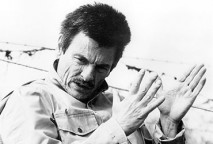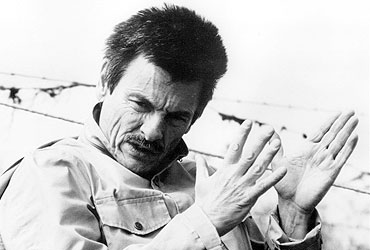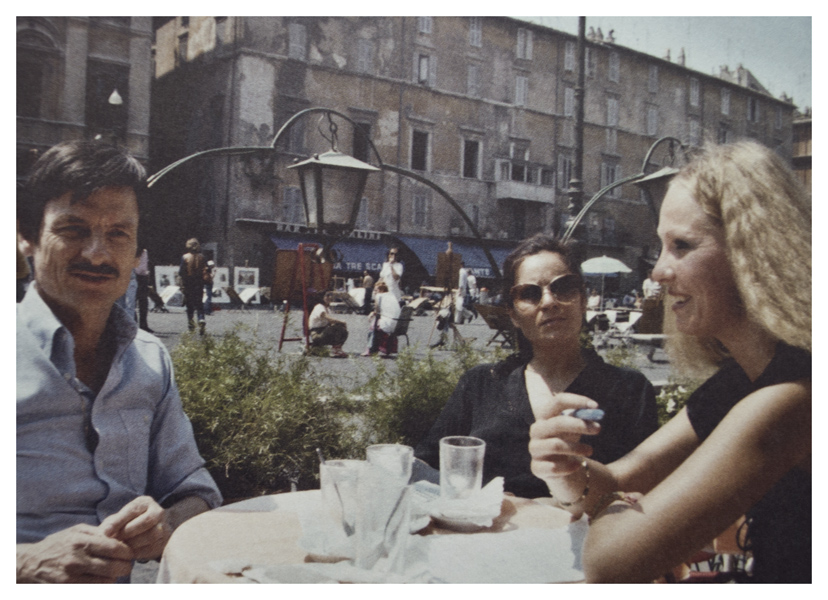Interviews / Andrei Tarkovski: profound, majestic and mysterious

andrei tarkovsky: profound, majestic & mysterious
An interview with Layla Alexander Garrett
by Jaap Mees
with help from Layla Alexander Garrett and Charlotte Carlsson

Jaap Mees interviews Layla Alexander Garrett who believes that meeting Tarkovsky and working with him was a matter of fate.
The renowned Swedish filmmaker Ingmar Bergman once said:
“Andrei Tarkovsky is for me the greatest, the man who invented a new language, true to the nature of film as mirror of life, life as a dream.”
The spiritual, lyrical and poetic film maker Andrei Tarkovsky (1932-1986) made seven features: Ivan’s Childhood (1962), Andrei Rublev (1966) Solaris (1972), Mirror (1974), Stalker (1979) all in Russia; Nostalgia (1983) in Italy and The Sacrifice (1986) in Sweden. He also made three shorts and a documentary, A Time of Voyaging (1982), impressions of Italy prior to making Nostalgia.
A scene from ‘Directed By Andrei Tarkovsky’ (1988) a documentary by M. Leszczylowski:
At the end of this documentary there is a country house in an open filed, specially been built to be set a fire.
The scene is, as often with Tarkovsky, carefully choreographed and shot in a complicated long tracking shot involving lots of actors running in and out of frame. Everyone is tense, not in the least Tarkovsky himself, knowing this is a key scene in the film. Action. Everything goes well, but then there is a major camera hiccup during end of the take.
Tarkovsky is devastated. The complete house has to be built up again and set a light. Just before the second take, crew and cast are even more nervous than before, Tarkovsky blesses Erland Josephson, the main character, and kisses him on his forehead.
This time, covered by two cameras just in case, the scene goes smoothly. Tarkovsky thanks everyone involved personally in different languages. Then he crosses a path with puddles in a large field and walks to the horizon on his own.
Credits.

Tarkovski and Layla Alexander Garrett.
|
An interview with Layla Alexander Garrett, a tall, blond woman with strong beautiful features, who believes meeting Tarkovsky and being chosen to work with him was a matter of fate. They got on very well. She did a question and answer session after the film, Directed By Andrei Tarkovsky was shown in the Russian film club Kino Kino! in the Cine Lumiere, South-Kensington. She worked as an interpreter and personal assistant on Tarkovsky’s last film The Sacrifice. She is Russian and studied the science and history of film in Sweden. Now she lives in London.
No, I was studying film and Tibetan at the time. But after Tarkovsky, people asked me to work with them, in theatre mainly, I worked with Yuri Lubimov at the Royal Dramatic Theatre on Pushkin’s ‘Feast During Plague Time’ and on Bulgakov’s ‘Master and Margarita’ and on Janacek’s ‘Jenufa’ in the Royal Opera House in Covent Garden. In Britain I worked with Derek Jarman. I played a Professor of Mathematical Logic, Sofia Janovskaya in Wittgenstein.
If you are an happy person, you wouldn’t be an artist. I think an artist is always tormented. Show me an artist who isn’t? Through pain you create your work. Look at Michelangelo, Da Vinci, Van Gogh, Gauguin etc. Tarkovsky must have been tormented all of his life, not just the years when he was compelled to stay in Europe in order to finish his projects: Boris Godunov at Covent Garden, The Sacrifice in Sweden and he was planning to do the Flying Dutchman in Covent Garden again and Hamlet. Tarkovsky was different with different people. He was like a sponge. If he liked you, he was great - gentle, caring and charming. If he didn’t…well…Heaven forbid! He could be nervous, and edgy, but also very intuitive, perceptive and funny. He had a wry sense of humour.
His films were so badly distributed because Tarkovsky was a controversial, provoking and uncompromising director. Andrei was also an exceptional clever man. He was always fighting for his art. I’m sure every true artist subconsciously knows that he is predestined for some great things. Alas, the mediocrity never forgives you for that. The irony is that Tarkovsky’s films have made more money in Western Europe than any other Russian director. His films were in great demand and were immediately requested by foreign film festivals. Who is distributed well nowadays, apart from Spielberg and other big Hollywood shots? Visconti, Fellini, Antonioni, Bergman, Kurosawa, even Bresson, Tarkovsky’s favourite?
Of course in an ideal world it isn’t. But he lived in a different world. A prophet is never recognised in his own country. Kurosawa wasn’t liked by the Japanese, Bergman was criticised by the Swedes, so Tarkovsky wasn’t unique in that respect. He had a very loyal group of followers. He was adored and admired by many Russians, right from his first feature film Ivan’s Childhood (62). People tried to break the doors of the cinemas in order to see his films!
Tarkovsky invented a new way of making films. As Bergman said he created a dream language, true to the nature of film. He trespasses the hidden region of the dream. I suppose when you are a genius, like Tarkovsky was, people always make your life difficult. It was the same for Sacharov, Pasternak, Mandelstahm, Achmatova, Tsvetayeva etc. It’s probably a very Russian thing, to go to extremes.
Only after Tarkovsky’s death, there was more freedom of expression and travelling. Solchenytsin once said he knew in is mind he will never come back to Russia, but in his heart he felt that he will be leaving there. Tarkovsky never believed that life in Russia could change. He tried to get his son Andryusha out of Russia, who he hadn’t seen in three years. He sent lots of letters to the authorities, which I helped him with, but with no result. Only when Tarkovsky was seriously ill and the X-rays were sent to Russia, was he eventually reunited with the son “he loved more than anything in the world".
The best way to describe Tarkovsky is to buy a ticket and watch his work! When I say he was a marvellous, clever, witty and interesting man, I can say the same for millions of other people. Tarkovsky wasn’t interested in entertaining people, when you go deep inside and when you are honest there is very little to entertain about. He invites you to make a step to another dimension, to embrace the spiritual. And it’s hard work, maybe that’s why some people didn’t like him very much. His films are not about understanding in a rational way, but more on an intuitive and super natural level. Tarkovsky likes to make riddles, like his father the poet Arseni Tarkovsky, who read some of his own beautiful poems in Tarkovsky’s most autobiographical film Mirror. He didn’t want to please the audience, he always knew he had a small (10-15%) but very loyal segment of the audience. I don’t think he cared much about the audience.
He wanted to see those films, not so much for the directors, but more to see the development of the technical side. He hadn’t had much chance to see them in Russia. Once he recommended my husband to see Terminator, he was very surprised. Tarkovsky was interested in the theme of the film: travelling in time and space.
If you make what is true to you, you will communicate, when you’re honest with yourself. He absolutely didn’t care about the audience, in the sense that he didn’t want to please, satisfy or tease them. He made films close to his heart.
My job was translating. The Swedish Institute had two million dollars to make the film. After the day's shoot had finished, Tarkovsky, his cameraman Sven Nykvist and I were talking about the film and preparing the next scenes. And also trying to delude the producer to create something extra, which wasn’t in the script. In Gotland where the film was shot, the cast and crew stayed in a hotel, Tarkovsky stayed in a house. In the first week we were getting up at 2.30am to catch the extraordinary light before sunrise, the magic hour, of the white nights. By the shore it was very cold because of the Baltic winds, but one kilometre away people were sunbathing.
Unfortunately Tarkovsky and Bergman never met. Bergman admires Tarkovsky and vice versa, but Bergman is rather shy and doesn’t want to meet new people, without being prepared. Later, when I worked at the Royal Dramatic Theatre in Stockholm, Bergman told me that every time before he made a new film, he watched Tarkovsky’s, Andrei Rublev.
He didn’t see himself as a prophet, others made him into one. He says things that matter to him.
No absolutely not. He was the most wonderful man to be with, but when he didn’t like you, he could be unfriendly and short. He was a very complex, difficult man. He said to me that he used to be much more angry in Russia, but during The Sacrifice he seemed much more at ease with himself. When you touch, I suppose, that different reality, that you know must exist, it changes you. I think he sensed it immediately when you wanted something from him. It was self protection, he wanted to be with people he liked. I think it’s inevitable to be selective and closed down when you are a public figure.
Absolutely, when he was young he wanted to be a musician and conductor. Like Bergman, also a great lover of Bach.
Tarkovsky: “there is nothing more beautiful and mysterious than simplicity.” He meant that in the ancient Greek way. He liked beauty very much, he could see it in the most unexpected places, like a dirty pool. True beauty shatters you, it gives you goose pimps. Dostoyevsky said that beauty will save the world. Andrei used to say it will help the world. Tarkovsky was very erudite, he loved literature, poetry, music and film. He started as a painter and studied piano and Arabic. During twenty years of his working life in Russia he made five feature films and he directed Hamlet in Moscow. In three years in the West he made two films, did a Boris Godunov opera in Covent Garden in London, wrote the book Sculpting in Time and he made the documentary A Time of Voyaging.
Bresson is another film director who doesn’t care about the audience, he made films he has to make, close to his heart. You can’t dictate those filmmakers to make films about fashionable subjects, they follow their own inner path. Essentially all great filmmakers are poets, like Bergman, Kurosawa, Mizoguchi, Bresson, Fellini, Antonioni (Kieslowski and Sokurov. J.M.) Tarkovsky: “My roots lie in the fact that I don’t love myself and that I don’t really like myself.” A person who likes everything about him/her self is probably a self satisfied person. He wouldn’t search somewhere else, other inner truths, inner beauty that man reflects of God.
I still dream about him. I feel that he helps me in my life. He is one of the most talented, inspired and gentle people I have ever met. Once he said to me: “I’m like Leonardo Da Vinci’s Man: crucified in a circle of life.” |
For me the essence of Tarkovsky’s work is the ever returning theme that man should search for his/her own spiritual sources to build a meaningful and complete existence. I admire Tarkovsky especially for his persevering strength to follow his own inner path, without compromising and for his unique poetic vision.
To the Russian journalist Olga Surkova he said:
“In all my films, it seemed important to me to remind the audience to the fact that they are not alone, lost in an empty universe, but that they are connected by innumerable threads with their past and present, that through certain mystical ways, every human being realises the rapport with the world and the life of humanity.”
Jaap Mees
With help from Layla Alexander Garrett and Charlotte Carlsson


